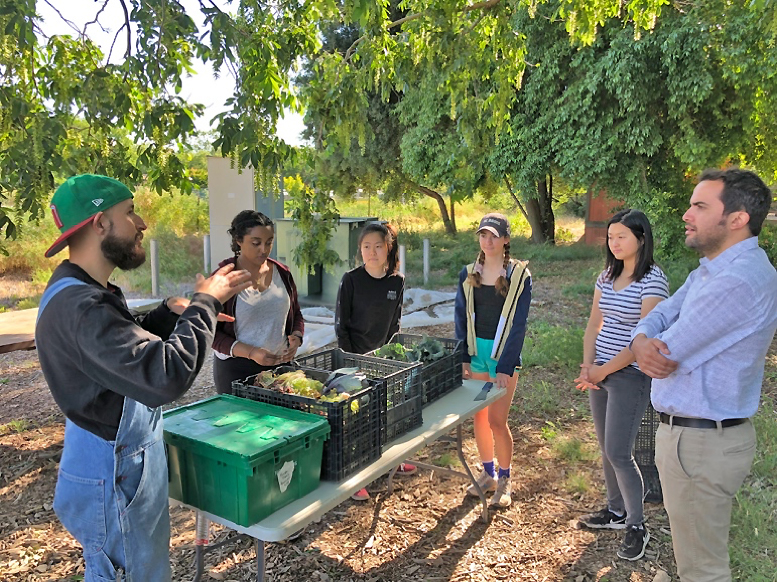Number one sustainable campus finds next challenge
Number one sustainable campus finds next challenge
Este artículo también está disponible en Español.
Where can you find a top-tier, sustainability-focused agricultural school, located in a college town near a famous wine-growing region? The answer appears obvious, but there’s another correct response found a hemisphere away, in Talca, Chile – home of the Universidad de Talca.
Because this international city and university already share many similarities with the City of Davis and UC Davis, learning about the unique approaches each takes on issues related to sustainability become especially relevant according to the Universidad de Talca’s Sustainability Manager and self-proclaimed “Biggest Fan of Davis,” Pablo Yáñez, after a recent trip.
“I came to visit Davis because I heard the keynote talk by UC Davis Director and Campus Sustainability Planner, Camille Kirk at the International Sustainable Campus Network conference. After this, I made it my mission to find a way to get here and learn more,” says Yáñez.
At the conference Kirk spoke of the Unitrans bus system started by students, and partially funded by the City, about the vast number of bicyclists and how City planning efforts support them, how students engage with the community on everything from selling locally grown produce to educating the public on the importance of tree care.

“These were the kinds of programs my university is interested in and the type of relationship we need to foster with our City,” says Yáñez. “I had to see it all in action.”
What Yáñez found was a great deal of inspiration. Thanks to an immersive exchange arranged by Kirk, he came away reinvigorated with ideas for how his university could engage further with students and move toward increased cooperation with local government entities.
“I spent time with students and was encouraged by how they walk the talk. The community shows an awareness of sustainability that’s hard to come by, it is ingrained in the culture here. Even better, the City is on the same page and supports environmentally friendly investments that benefit everyone.
“I’m also so impressed by the conviction and support of the UC Regents and President Napolitano for launching initiatives related to carbon neutrality, global food and sustainable innovation.”
Yáñez visit would not be the first time UC Davis collaborated with the Universidad de Talca. In fact, Universidad de Talca is a founding member of the UC Davis Chile Life Sciences Innovation Center, a non-profit foundation created by the UC Regents and the Chilean Ministry of Economy, whose objectives are to create a platform for collaborative research, technology transfer and educational programs between UC Davis and Chilean universities.
“Pablo came here to learn about our City and university, but we learned just as much,” says Kirk, director of sustainability for UC Davis. “They have broadened our horizons by sharing how they are moving to incorporate the United Nations Sustainable Development Goals into their university’s vision for a sustainable future.”
In September 2015, the United Nations General Assembly adopted the 2030 Agenda for Sustainable Development that includes 17 Sustainable Development Goals (UN SDG). According to the website, the Agenda emphasizes a “holistic approach to achieving sustainable development for all.” While including customary emblems of sustainability like energy reduction and natural resource conservation, the Agenda broadens its aims and includes goals like “Good Health and Well-being,” “Reduced Inequality,” and “Gender Equality.”
“UC Davis is currently ranked first in the nation in sustainability because we work hard to steward our resources, cut emissions and improve our community engagement programs, but if our students are hungry or our people are treated unfairly, then can we really say we’re sustainable,” asks Kirk.
“As a university, we can be proud of our accomplishments to date, but if we want to continue to be recognized as leaders in this arena, we must continue to elevate our goals and expand the idea of what it means to be truly sustainable.”
Creating new goals and partnerships are already in the works for these two sustainability leaders.
Kirk recently advised Chancellor May to sign the higher education climate emergency letter, further committing UC Davis toward attaining the UN’s sustainable education and climate change development goals. She is also mentoring the student-run sustainability grant program to incorporate UN sustainable development goals into their project application and assessment.
Meanwhile, Yañez is working with the City of Talca to create similar city-campus connections and with Katharina Ullman, director of the UC Davis Student Farm, to plan an international congress of universities with botanic gardens and farms in Chile.
“We’ve got a lot of work to do, but the more we can partner and share with others, the larger the impact we’ll have on our environment,” said Kirk.
To contact Pablo Yáñez, payanez@utalca.cl or linkedin.com/in/pabloyáñez. To contact Camille Kirk, cmkirk@ucdavis.edu or linkedin.com/in/camille-kirk.